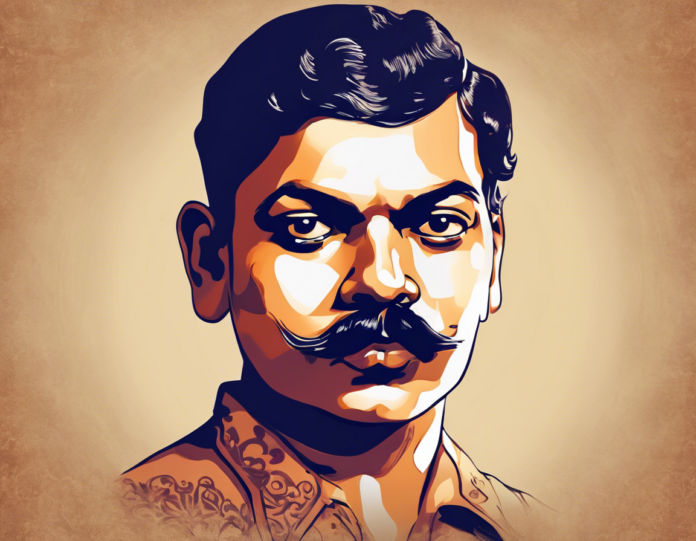Chandra Shekhar Azad, born Chandra Shekhar Tiwari, was an Indian revolutionary who played a key role in the Indian independence movement against British colonial rule. His life and legacy continue to inspire generations of Indians, who admire his fierce patriotism, bravery, and unwavering commitment to the cause of freedom. In this blog post, we will delve into the revolutionary legacy of Chandra Shekhar Azad, exploring his early life, contributions to the independence movement, and enduring impact on Indian history and society.
Early Life and Education
Chandra Shekhar Azad was born on July 23, 1906, in Bhavra village, in present-day Madhya Pradesh, India. Growing up in a deeply patriotic environment, he was influenced by the stories of Indian freedom fighters and their struggle against colonial oppression. His early exposure to the harsh realities of British rule instilled in him a strong desire to fight for his country’s independence.
Despite facing financial hardships, Azad was a bright student who excelled in his studies. He was deeply inspired by the sacrifices of revolutionaries like Bhagat Singh, Ram Prasad Bismil, and Ashfaqulla Khan, who had laid down their lives for the cause of freedom. Determined to follow in their footsteps, Azad dedicated himself to the struggle for independence from a young age.
Role in the Independence Movement
Chandra Shekhar Azad’s entry into the freedom struggle came at a time of growing discontent against British colonial rule in India. He joined the Non-Cooperation Movement led by Mahatma Gandhi in 1920, rallying against British policies and advocating for Swaraj or self-rule. Azad’s fiery speeches and bold actions quickly earned him a reputation as a fearless revolutionary who was willing to go to any lengths for the cause of independence.
One of Azad’s most notable contributions to the independence movement was his role in the Kakori Conspiracy of 1925. Alongside other revolutionaries, including Ram Prasad Bismil and Ashfaqulla Khan, he participated in the daring train robbery near Kakori, targeting British officials to procure funds for the revolutionary activities. Despite facing intense police scrutiny and a nationwide manhunt, Azad managed to evade capture, earning him the moniker “Azad,” meaning “free” in Hindi.
Ideology and Philosophy
Chandra Shekhar Azad was a proponent of revolutionary nationalism and believed in the use of force and armed struggle to overthrow British rule in India. He rejected non-violent methods of protest, arguing that a direct confrontation with the colonial authorities was necessary to achieve freedom. Azad’s commitment to the cause of independence was unwavering, and he remained steadfast in his resolve to fight for a free and sovereign India.
Azad was also a strong advocate for social justice and equality, emphasizing the need to address the socio-economic inequalities perpetuated by British colonialism. He believed in the empowerment of the masses and sought to inspire ordinary Indians to join the struggle for independence. Azad’s revolutionary zeal and visionary leadership continue to serve as an inspiration to activists and freedom fighters across India.
Legacy and Impact
Chandra Shekhar Azad’s legacy remains etched in the annals of Indian history as a symbol of courage, sacrifice, and determination. His martyrdom on February 27, 1931, in a fierce gun battle with the British police at Alfred Park (now Azad Park) in Allahabad, further elevated his status as a national hero. Azad chose to shoot himself rather than surrender to the colonial forces, embodying his steadfast refusal to bow down to tyranny.
Azad’s revolutionary spirit and commitment to the cause of independence continue to inspire generations of Indians to uphold the values of freedom, justice, and equality. His fearless defiance of British oppression and his ultimate sacrifice for the nation have cemented his status as an icon of the independence movement. The legacy of Chandra Shekhar Azad serves as a reminder of the enduring power of patriotism and the indomitable spirit of those who strive for a better future.
FAQ Section:
Q1: What was Chandra Shekhar Azad’s real name?
A1: Chandra Shekhar Azad’s original name was Chandra Shekhar Tiwari. He later adopted the pseudonym “Azad,” meaning “free” in Hindi, to signify his commitment to the cause of freedom.
Q2: What was Chandra Shekhar Azad’s role in the Kakori Conspiracy?
A2: Chandra Shekhar Azad participated in the Kakori Conspiracy of 1925, a daring train robbery aimed at procuring funds for the revolutionary activities against British colonial rule. The incident marked a key moment in the struggle for independence.
Q3: What was Chandra Shekhar Azad’s ideology?
A3: Chandra Shekhar Azad believed in revolutionary nationalism and advocated for armed struggle against British colonialism. He rejected non-violent methods and emphasized the need for direct action to achieve independence.
Q4: How did Chandra Shekhar Azad inspire future generations?
A4: Chandra Shekhar Azad’s bravery, sacrifice, and unwavering commitment to the cause of independence have inspired generations of Indians to uphold the values of freedom, justice, and equality. His legacy continues to resonate in the hearts of those who strive for a better India.
Q5: Where did Chandra Shekhar Azad attain martyrdom?
A5: Chandra Shekhar Azad attained martyrdom on February 27, 1931, in a gun battle with the British police at Alfred Park (now Azad Park) in Allahabad. Rather than surrender, he chose to shoot himself, affirming his refusal to submit to colonial tyranny.












